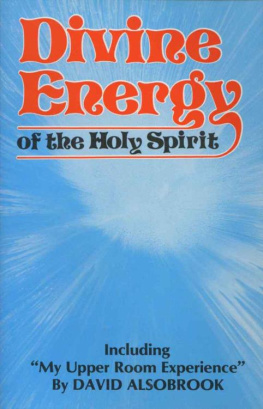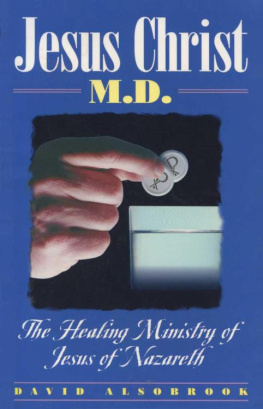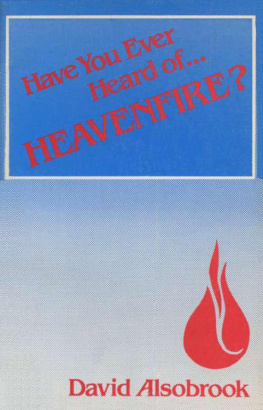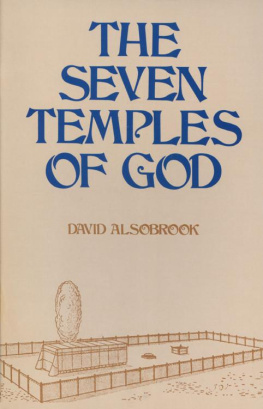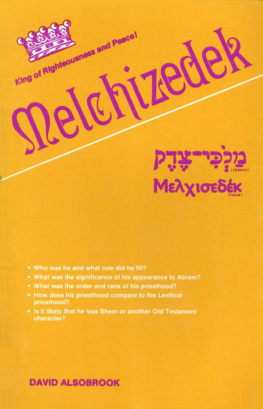David Alsobrook - Divine energy of the Holy Spirit
Here you can read online David Alsobrook - Divine energy of the Holy Spirit full text of the book (entire story) in english for free. Download pdf and epub, get meaning, cover and reviews about this ebook. City: Paducah, Ky, year: 1985, publisher: David Alsobrook Ministries, genre: Religion. Description of the work, (preface) as well as reviews are available. Best literature library LitArk.com created for fans of good reading and offers a wide selection of genres:
Romance novel
Science fiction
Adventure
Detective
Science
History
Home and family
Prose
Art
Politics
Computer
Non-fiction
Religion
Business
Children
Humor
Choose a favorite category and find really read worthwhile books. Enjoy immersion in the world of imagination, feel the emotions of the characters or learn something new for yourself, make an fascinating discovery.
- Book:Divine energy of the Holy Spirit
- Author:
- Publisher:David Alsobrook Ministries
- Genre:
- Year:1985
- City:Paducah, Ky
- Rating:5 / 5
- Favourites:Add to favourites
- Your mark:
- 100
- 1
- 2
- 3
- 4
- 5
Divine energy of the Holy Spirit: summary, description and annotation
We offer to read an annotation, description, summary or preface (depends on what the author of the book "Divine energy of the Holy Spirit" wrote himself). If you haven't found the necessary information about the book — write in the comments, we will try to find it.
Divine energy of the Holy Spirit — read online for free the complete book (whole text) full work
Below is the text of the book, divided by pages. System saving the place of the last page read, allows you to conveniently read the book "Divine energy of the Holy Spirit" online for free, without having to search again every time where you left off. Put a bookmark, and you can go to the page where you finished reading at any time.
Font size:
Interval:
Bookmark:
Contents
Chapter One
Chapter Two
Chapter Three
Chapter Four
Chapter Five
Chapter Six
Chapter Seven
One
The Full Pentecost or What Is the Gift of the Holy Spirit?
One hot afternoon a few summers ago I was resting in my room during a series of meetings. As I lazily leafed through my Bible reading randomly selected passages I fell upon Acts 2. For many years I had known the historical account of the initial outpouring of the Holy Spirit upon the followers of Jesus. I started to pass on by the second chapter of Acts when I sensed an inward nudging to remain there.
That day I learned something from Luke's account of the first descent of the Holy Ghost upon the Church which deeply intensified my understanding of the wonderful experience we call "the baptism with the Holy Spirit. You may be very familiar with these four verses, like I was, and tend to think you know it, too! A fuller understanding, perhaps, awaits you in this chapter.
May the Lord teach us His Word in clarity and may we have ears to hear what the Spirit is saying in regard to "the full Pentecost." I will share it with you the way He shared it with me.
Accept what He makes real to you; shelve the rest.
The Day of Pentecost Was Fully Come (Acts 2:1)
"And when the day of Pentecost was fully come, they were all with one accord in one place."
On this particular afternoon the phrase "the day of Pentecost was fully come" kept repeating in my spirit, especially the words "fully come" until a phrase (THE FULL PENTECOST) registered inside me. I was made to know the full pentecostal experience affects the full person. The apostle identified the three parts of man in I Thessalonians 5:23: "...your whole spirit, and soul and body... Each of the three verses in Acts 2 (verses 2 ,3 and 4) has an application to each realm of man's being. Verse 2 (the rushing, mighty wind) corresponds to the enduement of POWER in the believer's spirit. Verse 3 (cloven tongues of fire) refers to the PURIFICATION of the believer's soul. Verse 4 (speaking with other tongues) describes the supernatural EXPRESSION in the believer's body. Thus, there is power, purging and expression in this baptismal experience.
I want to be clear from the outset: this is not an exhaustive treatise on the Person and work of the Holy Spirit Nor is this study the only meaning of the text. We could study the passage from its historical perspective (showing how the Feast of Pentecost was sandwiched between Passover and Tabernacles with its related meanings). We could study the wind and the fire which came on that day as the fulfillment of the cloud and fire on Mt. Sinai at the dispensation of the law or that later came as the coronation of glory on Solomon's temple. The glorious Pentecost of the church age is far more entailed than this volume presents. Only a few truths are endeavored here.
They Were All with One Accord in One Place
In a symphony all the instruments must be correctly sounded in perfect harmony and tonal pitch. The 120 had continued in prayer and supplication for ten days. Perhaps their number had been larger at the beginning of their prayer time, as Paul informs us that our risen Lord appeared to more than 500 brethren on one occasion and Olivet seems the only place where the risen Savior appeared that would be large enough to accommodate that many (see 1 Corinthians 15:6 with Acts 1:6-12). It was on Olivet that Jesus commanded them to "wait for the promise of the Father, which saith He, ye have heard of Me. For John truly baptized with water; but ye shall be baptized with the Holy Ghost not many days hence" (Acts 1:4-5)
After beholding His ascension the disciples left Olivet and returned to Jerusalem where they went into a large upstairs room. Sometime during the ten days of prayer Peter addressed them concerning a replacement for Judas Iscariot. At whatever point this occurred, the group numbered "about an hundred and twenty" (Acts 1:15).
If our supposition is correct, there were about 380 (since 500 heard Christ's instructions at Olivet) who quickly tired of the continual waiting in prayer. The glorious spectacle of the Ascension and the sure promise that an enduement of power awaited them in Jerusalem were not enough to keep the majority during the long hours which stretched Into days.
It Is for certain the 380 received the Holy Spirit later as soon as the exciting news of His outpouring reached their ears, (because Paul refers to them years later as "brothers in Christ"), but where were they on that unique day? They missed the initial outpouring with its singular events.
The 120 who did remain in the upper room "were all with one accord in one place" on that day. Jesus earlier promised "for where two or three are gathered together in My name, there am I in the midst (Matthew 18:20). The Greek verb for "are gathered" denotes a oneness of purpose even more than a oneness of place (which is also implied). The 120 were all "with one accord" as well as in one place. This unison came about in the only way It can come into being: by united, fervent prayer and worship! As we get our hearts aligned with the Father they will knit with each other. In this unity of heart and mind the Lord Jesus came into their midst in the Person of the Holy Spirit.
The Enduement of Power upon the Believer's Spirit (Acts 2:2)
And suddenly there came a sound from heaven as of a rushing mighty wind, and it filled all the house where they were sitting.
The first thing that happened was "a sound from heaven" which came suddenly. The first sign of restoration in the valley of dry bones was a noise (Ezekiel 37:7). When Israel was liberated from seventy years of exile their mouths were ''filled with laughter and their "tongues with singing (Psalm 126:2). Likewise Jeremiah had predicted Again there shall be heard... th.e voice of joy and the voice of gladness... (Jeremiah 33:10-11). When restoration comes the first sign is holy noise. Every revival in church history has been marked by joyful and protracted singing.
In this case the sound was that "as of a rushing mighty wind." The adjectives "rushing" and "mighty" speak of speed and power. God is doing a quick and powerful work in the lives of His people when He fills them with His Spirit. The word "wind" is noteworthy inasmuch as Jesus likened the moving of the Holy Spirit to wind in John 3:8. The same word for "wind" can also be translated "spirit" throughout the New Test am ent. The wind of Acts 2:2 was a supernatural force proceeding directly from heaven. Jesus had gone away into heaven and now the Paraclete had come from heaven (see John 16:7). The Holy Spirit " proceedeth from the Father" (John 15:26). Jesus promised "if I depart, I will send Him unto you."
The wind currents denote power and force. Life came to the defeated army of Ezekiel's vision in this manner: "Come from the four winds, O breath, and breathe upon these slain that they may live. So I prophesied as He commanded me, and the breath came into them, and they lived, and stood up upon their feet, an exceeding great army" (Ezekiel 37:9-10). The Hebrew word for "breath" and "wind" is also the same word and is elsewhere translated "spirit" the same as it is in Greek.
Thus it is clear that the wind of the Holy Spirit came for an enduement of power in the realm of the disciples' spirit. Jesus had instructed them to tarry in the city of Jerusalem until they were clothed upon with power from on high shortly before He was carried up into heaven (see Luke 25:49-50). At Olivet He promised them "...ye shall receive power after that the Holy Ghost is come upon you." (Acts 1:8). The word for "power" in the Greek is similar to our word "dynamite" in English. It refers to tangible, literal power and ability. The source of this tangible, literal power is the Holy Spirit who anoints believers with His power. We must be careful to always recognize that the power which flows through a vessel does not originate within that person. Power belongs unto God (Psalm 62:11), but He generously gives it to the faint (Isaiah 40:29).
Font size:
Interval:
Bookmark:
Similar books «Divine energy of the Holy Spirit»
Look at similar books to Divine energy of the Holy Spirit. We have selected literature similar in name and meaning in the hope of providing readers with more options to find new, interesting, not yet read works.
Discussion, reviews of the book Divine energy of the Holy Spirit and just readers' own opinions. Leave your comments, write what you think about the work, its meaning or the main characters. Specify what exactly you liked and what you didn't like, and why you think so.

